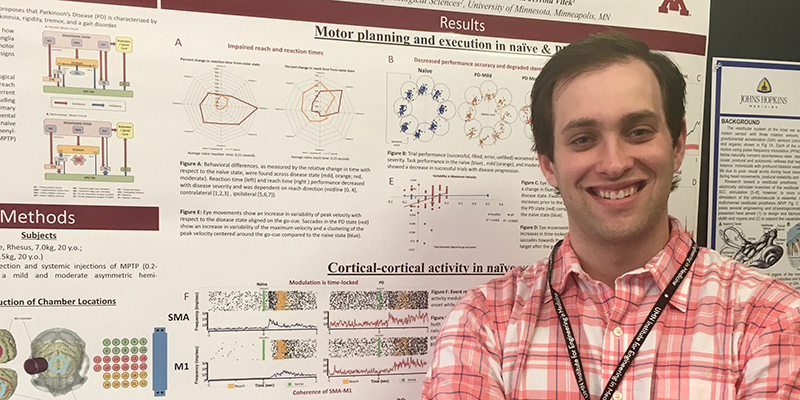This CBS undergraduate has the brains for neuroscience.

Your name: Zachary Weinstock
Your year: Senior
Your major: Neuroscience (minors in Pharmacology & Psychology)
What research have you been involved in on campus?
I've spent time in a few labs around campus but the one that has by far been most formative is the Neuromodulation Laboratory headed by Dr. Jerrold Vitek. I've spent the last 3 years working in Dr. Vitek's lab where I work with non-human primates to investigate the pathophysiology of Parkinson’s Disease and the therapeutic mechanisms of of deep brain stimulation (DBS). DBS is an extremely effective and increasingly prevalent treatment for late-stage Parkinson's disease, and we are particularly interested in understanding exactly how it elicits such a profound change in behavior. The end goal of this research is to generate knowledge that can used in the development of more effective DBS therapies for the treatment of movement disorders like Parkinson's disease.
What was the most challenging thing you learned while working in the lab?
Learning how to scrape the dura mater, the toughest and most fibrous of the meninges that surround and protect the brain. My lab uses glass-tipped, ultra-fine microelectrodes to record the electrical activity of single motor units (neurons). These electrodes are even more fragile than they sound and therefore, it is important to limit the amount of tough material through which they are expected to burrow.
To prevent electrode breakage, we must routinely pare down the tissue to keep it as thin as possible. The first few times are quite nerve-wracking because you are essentially taking a razor-sharp spoon and carefully raking it across the surface of the brain. A gentle touch and a steady hand are key, otherwise you risk pushing into the brain itself or ripping the dura and exposing the central nervous system to the external environment.
What are your future career aspirations?
As an aspiring M.D./ Ph.D., I have an intense desire to apply my knowledge of neurodegenerative disorders to my interests in regenerative medicine. I believe that the NIH-funded Medical Scientist Training Program(MSTP) will best prepare me for a career in translational medicine and my short term goal is to enter one such program in the Fall of 2018. Following my professional education, I envision a career for myself in which I am jointly appointed to both a university’s hospital and medical school as a clinician and professor, respectively. This arrangement will leave me in an excellent position to integrate lab work and patient care such that I might develop more effective therapies for my future patients.
If you had one piece of advice to your first-year self in CBS, what would it be?
Be organized! Although it isn't necessary to have every due date and assignment entered into your calendar by the beginning of the semester, it will make your life infinitely easier if you give yourself sufficient time to prepare for and complete projects.